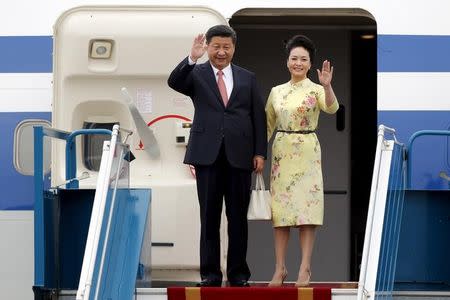China's Xi in Vietnam to advance 'comradely' ties

By Martin Petty HANOI (Reuters) - China's President Xi Jinping arrived in Hanoi on Thursday on a visit crucial to rebuilding ties strained by maritime disputes, and made more uncertain by Vietnam's upcoming reshuffle of its Communist Party leadership. Any cracks in relations are likely to be covered over when Xi meets Vietnam's party heavyweights, some of whom have received some unprecedented U.S. wooing since a breakdown in Sino-Vietnamese ties last year over South China Sea sovereignty. Although overshadowned by Saturday's landmark meeting with his Taiwanese counterpart, Xi's 24-hour Vietnam visit is crammed with meetings that include its president, party chief, prime minister and legislative chairman, figures seen central to deciding the foreign policy trajectory of a rapidly changing country. Xi will also address the national assembly on Friday and comes amid anticipated jockeying for key positions ahead of Vietnam's party congress in January. He is expected to present a case to Vietnam for tighter economic ties beyond its new trade pacts, which include the U.S.-led Trans-Pacific Partnership. A lot has changed since Beijing moved an oil rig unannounced into disputed waters last year and triggered an eruption of Vietnamese anger. Small demonstrations have been held this week, including a brief protest on Thursday amid large police presence outside China's embassy in Hanoi. China's reclamation work near the contested Spratly Islands has fuelled resentment and put Vietnam in a tricky spot, as has recent sparring between Beijing and Washington over freedom of navigation. Xi is due to sign several agreements on Thursday before meeting Nguyen Tan Dung, Vietnam's pro-business prime minister who was the first of its leaders to publicly criticise China over the rig incident. Vietnam has been diversifying its economic ties and although China is not among its top investors, it is its largest trading partner at $60 billion a year and the biggest source of its imports, ensuring a dependence that remains a contentious domestic issue. In a commentary on Thursday, China's official Xinhua news agency said now was the time to add substance to a "comradely and brotherly" friendship. "Beijing and Hanoi should never shake their confidence in face of any noises pouring cold water on or even slinging mud at their partnership," it said. "Nor should they allow such parochial and ill-intended views to go unchecked and mislead public opinion towards the unfathomable abyss of confrontation." (Editing by Raju Gopalakrishnan)

